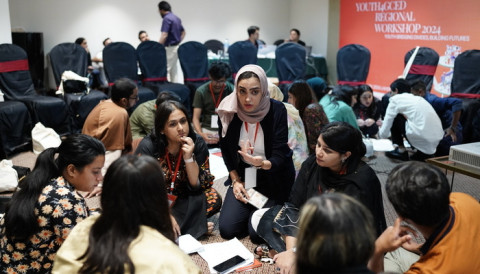
GCED Basic Search Form
Quick Search
Вы здесь
Новости

24 November 2024
In Lahore, Pakistan, from 31 October to 2 November 2024, UNESCO Asia-Pacific Centre of Education for International Understanding (APCEIU) under the auspices of UNESCO convened the Youth4GCED Regional Workshop in South Asia, in collaboration with the GCED Youth Network and The Little Art. This event brought together 28 young leaders from 7 South Asian countries under the theme of "Youth Bridging Divides, Building Futures: GCED, Social Justice, and Emerging Technologies for a Sustainable South Asia."

The first day of the workshop laid the foundational understanding of GCED, with activities designed to enhance participants' understanding and application in their local contexts. It started with opening remarks by the director of Dr LIM Hyun Mook, Director of APCEIU, emphasized the role of youth today, encouraging the participants to develop and share knowledge, skills and solidarity throughout the Workshop. Following up, Mr Umair Mushtaq, the interim director of The Little Art facilitated team-building exercises, and Mr Diego Manrique, a core member of the GCED Youth Network introduced the core framework of GCED with interactive exercise. Dr Tania Saeed from Lahore University of Management Sciences (LUMS) led a session on the power of storytelling and its key roles in promoting GCED.

In the afternoon, Sukyung Go from APCEIU introduced APCEIU's youth projects andthe Recommendation on Education for Peace and Human Rights, International Understanding, Cooperation, Fundamental Freedoms, Global Citizenship and Sustainable Development (hereinafter UNESCO 2023 Recommendation. Dr Zafar Malik from UNESCO Islamabad discussed GCED and youth initiatives, followed by Dr Richa Bansal from UNESCO MGIEP presented on Social Emotional Learning (SEL) online. Finally, Mr Rafiq Jaffer, international youth development and training expert, led a session using role play to address regional challenges. The day ended with the initiation of drafting the South Asian Youth Declaration on GCED (hereinafter Youth Declaration), facilitated by the GCED Youth Network, where participants shared their ideas for the declaration.After closing the program for the day, participants joined a cultural visit to Lahore’s Walled City, a historical site of significant importance for Pakistan.

On the second day of the workshop, with a facilitation by the core members of GCED Youth Network, participants explored the intersection of advocacy and technology through panel discussions and breakout sessions. These discussions focused on utilizing technology for social change and addressing regional challenges through collaborative solutions. The day also included further development of the Youth Declaration, with a strong emphasis on the critical role of youth in shaping future educational frameworks and contributing to sustainable development initiatives.

The last day of the workshop started with an interactive session on teaching GCED through arts by Mr Umair Mushtaq, and followed by Mr Muhammed Zahid’s session on AI and AI tools for youth empowerment. These sessions culminated on the third day with participants finalizing the first draft of South Asian Youth Declaration on GCED. Comprising the three part; Preamble, Call to Action, and Commitment, the Declaration underlines the South Asian youth’s role in shaping a sustainable future as global citizen.
The Youth4GCED Regional Workshop underscored the transformative role of youth in GCED aligning with the key points of UNESCO 2023 Recommendation . The workshop not only enhanced the participants' understanding of GCED but also showcased the potential of youth in advancing transformative education strategies across South Asia. The draft of Youth Declaration on GCED, one of the key outcome of this workshop, those youths participated in this workshop promised their commitment to employing GCED for sustainable development, highlighting the dynamic role of youth as key agents of change.

